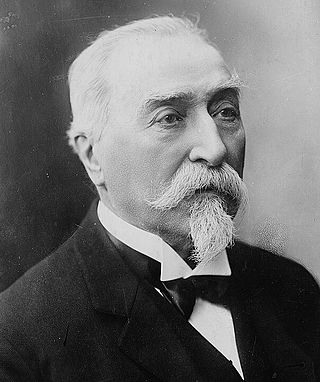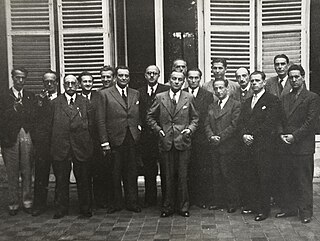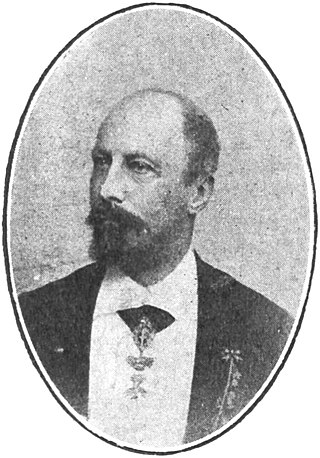
Pierre Marie René Ernest Waldeck-Rousseau was a French Republican politician who served for three years as the Prime Minister of France.

Émile Justin Louis Combes was a French politician and freemason who led the Lefts Bloc cabinet from June 1902 to January 1905.

Orléanist was a 19th-century French political label originally used by those who supported a constitutional monarchy expressed by the House of Orléans. Due to the radical political changes that occurred during that century in France, three different phases of Orléanism can be identified:

The French Third Republic was the system of government adopted in France from 4 September 1870, when the Second French Empire collapsed during the Franco-Prussian War, until 10 July 1940, after the Fall of France during World War II led to the formation of the Vichy government. The French Third Republic was a parliamentary republic.

Paul Gouin was a politician in Quebec, Canada, was the son of Sir Lomer Gouin and the grandson of Premier Honoré Mercier.

Michel Chartrand was a Canadian trade union leader from Quebec.

Adrien Albert Marie, Comte de Mun, was a French political figure, nobleman, journalist, and social reformer of the nineteenth century. Born into a noble family de Mun joined the French army at a young age serving during the French conquest of Algeria, the Franco-Prussian War and the suppression of the Paris Commune. A devout Catholic, de Mun became interested in Catholic Social Teaching while he was a prisoner of war in Germany.

The Biographical Dictionary of the Extreme Right Since 1890 is a reference book by Philip Rees, on leading people in the various far right movements since 1890. It contains entries for what the author regards as "the 500 major figures on the radical right, extreme right, and revolutionary right from 1890 to the present" . It was published, as a 418-page hardcover, in New York by Simon & Schuster in 1990 (ISBN 0-13-089301-3).
The Cartel of the Left was the name of the governmental alliance between the Radical-Socialist Party, the socialist French Section of the Workers' International (SFIO), and other smaller left-republican parties that formed on two occasions in 1924 to 1926 and in 1932 to 1933. The Cartel des gauches twice won general elections, in 1924 and in 1932. The first Cartel was led by Radical-Socialist Édouard Herriot, but the second was weakened by parliamentary instability and was without one clear leader. Following the 6 February 1934 crisis, President of the Council Édouard Daladier had to resign, and a new Union Nationale coalition, led by the right-wing Radical Gaston Doumergue, took power.

The Collège de Montréal is a subsidized private high school for students attending grades 7–11 located in downtown Montreal, Quebec, Canada. A former Roman Catholic minor seminary, it was founded on June 1, 1767 as the Petit Séminaire of Montreal by the Sulpician Fathers. From 1773 to 1803, it was known as Collège Saint-Raphaël.

The Union nationale was a conservative and nationalist provincial political party in Quebec, Canada, that identified with Québécois autonomism. It was created during the Great Depression and held power in Quebec from 1936 to 1939, and from 1944 to 1960 and from 1966 to 1970. The party was founded by Maurice Duplessis, who led it until his death in 1959.

The National Council of the Resistance directed and coordinated the different movements of the French Resistance during World War II: the press, trade unions and political parties hostile to the Vichy regime, starting from mid-1943.
The far-right tradition in France finds its origins in the Third Republic with Boulangism and the Dreyfus affair. In the 1880s, General Georges Boulanger, called "General Revenge", championed demands for military revenge against Imperial Germany as retribution for the defeat and fall of the Second French Empire during the Franco-Prussian War (1870–71). This stance, known as revanchism, began to exert a strong influence on French nationalism. Soon thereafter, the Dreyfus affair provided one of the political division lines of France. French nationalism, which had been largely associated with left-wing and Republican ideologies before the Dreyfus affair, turned after that into a main trait of the right-wing and, moreover, of the far right. A new right emerged, and nationalism was reappropriated by the far-right who turned it into a form of ethnic nationalism, blended with anti-Semitism, xenophobia, anti-Protestantism and anti-Masonry. The Action française (AF), first founded as a journal and later a political organization, was the matrix of a new type of counter-revolutionary right-wing, which continues to exist today. During the interwar period, the Action française and its youth militia, the Camelots du Roi, were very active. Far right leagues organized riots.
The Republican Federation was the largest conservative party during the French Third Republic, gathering together the progressive Orléanists rallied to the Republic.

The Popular Liberal Action, simply called Liberal Action, was a political party that represented Catholic supporters of the French Third Republic. It operated in the center-right, primarily to oppose the left-wing Republican coalition led by Pierre Waldeck-Rousseau and Émile Combes who pursued an anti-clerical agenda designed to weaken the Catholic Church, especially its role in education. The ALP between 1901 in 1914 had its best election in 1902, with 78 deputies. It built a nationwide newspaper and propaganda network, had excellent funding. There were 1200 local committees, with 200,000 dues paying members in 1906.
The Progressive Republicans were a parliamentary group in France active during the late 19th century during the French Third Republic.

Charles-Humbert-René de La Tour du Pin Chambly de La Charce,, was a French military officer, politician and social reformer.

Jules de Cuverville was a French naval officer who rose to become Chief of Staff of the French Navy. He entered politics in later life, elected to the senate where between 1901 and 1912 he represented Finistère.

Paul Dussaussoy was a French lawyer and politician. Born in Dunkirk, Nord, he was a deputy to the national assembly from 1893 to 1902 and again from 1906 until his premature death in 1909. He introduced the first French bill that proposed to give votes to women, at first limited to local elections.

The assassination of Jean Jaurès occurred on Friday 31 July 1914. Jaurès was a French deputy for the department of Tarn, a Socialist politician, a prominent antimilitarist, and editor of the newspaper L'Humanité. He was attacked by Raoul Villain at 9:40 pm while he dined at the Café du Croissant on rue Montmartre in Paris's 2nd arrondissement, close to the newspaper's headquarters. Jaurès was hit by two gunshots: one bullet pierced his skull and killed him almost instantly.
















